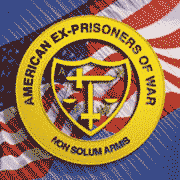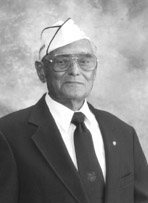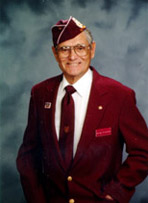
Established April 14, 1942
 |
American Ex-Prisoners of War
A not-for-profit, Congressionally-chartered veterans’ service organization advocating for former prisoners of war and their families.
Established April 14, 1942 |


Nat. Commander 1997-98
|

Sr. Vice Commander 1996-97
|
|
| Last Name | First Name, Middle Init. | Nickname |
| Spouse | City | State, Zip |
| Conflict — Theatre | Branch of Service | Unit: |
| Military Job | Date Captured | Where Captured |
| Age at Capture | Time Interned | Camps |
| Date Liberated | Medals Received | |
| After the War ... | ||
Hitchcock, reared on a farm in Indiana, graduated from a small country high school, attended Ball State University, Muncie, IN for a short time, before entering the service in 1942. Assigned to the Army Air Corps, he was sent to Aerial Gunnery School, at Buckingham Air Base Ft. Myers, Florida. He remained there for a time as an instructor, later joining a combat crew and training for overseas duty in B-24s. Upon arriving in Foggia, Italy, his crew was assigned to B17s. Hitchcock, flying as tail gunner, was shot down, April 3, 1944, over Hungary on his 14th mission and after a few infamous box car rides, spent the next 13 months in Stalag 17B, Krems, Austria. The camp was evacuated April 8, 1945 and the prisoners were marched across Austria and liberated on May 3, 1945 by Patton's 3rd Army.
Returning to Indiana, Hitchcock became a home builder, land developer and real estate broker, later returning to government service and retiring after 30 years, the last 23 as postmaster. He and his wife, Joanna (Jo) retired to Florida in 1979. Since retirement, they both have donated full time to the American Ex-Prisoners of War Organization. He has held office and/or served on essential committees at the department and national level sin 1982. This past year he served as senior Vice Commander, National Legislative Chairman and Legislative Reporter.
A life member of the VFW, American Legion, DAV and American Ex-Prisoners of War, a member of the Methodist church, spent 20 years as Boy Scoutmaster and a 50 year member of Lions International. Hitchcock was awarded, among others, the Air Medal with one Oak Leaf, European Campaign Medal with 3 Stars and the Prisoner of War Medal.
Hitchcock was instrumental in obtaining funds for the National Prisoner of War Museum at Andersonville, GA. The museum was dedicated on April 9, 1998 during his term as Commander. Also he was privileged to speak along with President Clinton on Veterans Day (November 11, 1997) at the Arlington National Cemetery.
Hitchcock and his wife of 56 years have traveled extensively throughout the world and are the parents of one daughter, one son (now deceased), 5 grandchildren and one great grandson.
The honored veterans who gave their lives and those who survived remind us of our countries heritage, and responsibility to serve in times of war. Veteran's organizations by their our very existence, stand for a kind of character that must be preserved forever. This is necessary if our nation, or any nation, is to survive and remain strong. We answered a call during WWII, Korea, Vietnam and other conflicts that threatened our ideals and beliefs. We did our duty as fighting and went home.
Some recovered from the wounds of war, and built new lives for themselves and loved ones. Many gave up what they could never recover and still linger in pain and suffering. Many only lost time at home with sweethearts, wives, husbands, parents and children. Some gave up careers or advancements they would never later achieve. Many gave their lives! But in doing so, let us think that life for others became much more meaningful.
As solders, we lived for the hope of peace beyond all battles and sacrifices. We lived beyond the moment's inequities and inconveniences. We lived for the future more than the present. We lived for others rather than for ourselves. Today the American Soldier represents for all the world a kind of character that neither this nation nor the entire planet ever dare to be without. What has made us strong and great is our willingness to sacrifice today for what tomorrow can bring in both peace and war. Let us remember always, that whenever world freedom is at stake, we must rise again like we did for WWII. It matters not the wounds of battle or the lingering pain that always follows. What matters most is our commitment and devotion to our countries freedom. Sometimes at great cost to ourselves we must defend our nation when these ideals are threatened. This justifies the sacrifice for the American fighting men.
My prayer for all time is that our country, AMERICA, still embodies all these values in the future. Wounds will heal, pain will cease, but what we fought and suffered for will live forever, as long as those who come after us share that same devotion